 Petzlover
Petzlover Catahoula Cur is originated from United States but Maltese is originated from Italy. Catahoula Cur may grow 46 cm / 19 inches higher than Maltese. Catahoula Cur may weigh 43 kg / 95 pounds more than Maltese. Both Catahoula Cur and Maltese has almost same life span. Catahoula Cur may have more litter size than Maltese. Catahoula Cur requires Low Maintenance. But Maltese requires Moderate Maintenance
Catahoula Cur is originated from United States but Maltese is originated from Italy. Catahoula Cur may grow 46 cm / 19 inches higher than Maltese. Catahoula Cur may weigh 43 kg / 95 pounds more than Maltese. Both Catahoula Cur and Maltese has almost same life span. Catahoula Cur may have more litter size than Maltese. Catahoula Cur requires Low Maintenance. But Maltese requires Moderate Maintenance
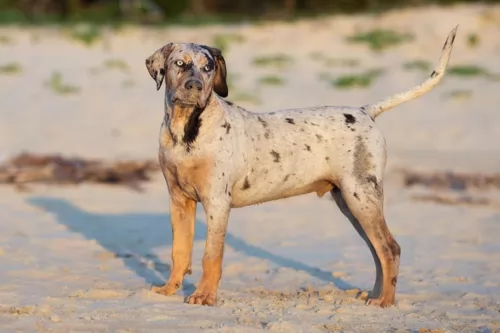 The Catahoula Cur is also known as the Catahoula Leopard Dog or the Louisiana Catahoula. The dog hails from Louisiana, United States.
The Catahoula Cur is also known as the Catahoula Leopard Dog or the Louisiana Catahoula. The dog hails from Louisiana, United States.
It is thought that the Catahoula Cur or Catahoula Hound as it is also known, used to be a hunting dog. The first settlers in Louisiana needed a strong dog to help them with hunting wild hogs and they bred their dogs with other dogs belonging to the locals. This gave them a strong, resilient dog that could take on the wild hogs and also protect their livestock.
Dogs who have no doubt been brought into the mix to produce the Catahoula Cur are mastiffs, Beaucerons, sighthounds and wolves.They are today more commonly referred to as Catahoula Leopard Dogs.
 The Maltese dog hardly needs any introduction as this is an ancient breed which is still as popular as ever. Some people refer to it as the "Maltese Lion Dog," or "Melita" which was Malta’s previous name.
The Maltese dog hardly needs any introduction as this is an ancient breed which is still as popular as ever. Some people refer to it as the "Maltese Lion Dog," or "Melita" which was Malta’s previous name.
It was in the 19th century, that the Kennel Club settled on the name of Maltese for the dog breed. The dog has been selectively bred to keep its small size. The exact origin of the dog is unknown and there are various stories surrounding where its origins are, thought to be Italy.
It is believed that dogs such as spaniels and poodles have been used to bring about the Maltese. The American Kennel Club, a registry for pure bred dogs, recognized the breed in 1888.
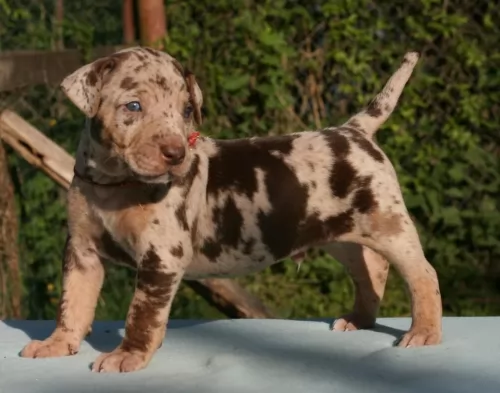 There are varying sizes for Catahoulas and a typical height is 51–66cm and weighing anything from 18 – 51kg. These Cathoula Cur’s come in different colors too, but the leopard-like coat is a dominant feature with this dog.
There are varying sizes for Catahoulas and a typical height is 51–66cm and weighing anything from 18 – 51kg. These Cathoula Cur’s come in different colors too, but the leopard-like coat is a dominant feature with this dog.
While there are solid colors, you can expect red- and blue merle, grey-, black, patchwork and brindle too.
The length of the coat varies somewhat too and while the coat is essentially short and smooth, there are Catahoulas where the coat is a little longer and more coarse.
The eyes of the Catahoula Cur are another interesting feature and both eyes can be the same color, but in some instances the one eye can be brown while the other could be blue, green or gray. The ears of the Catahoula Cur are medium in size and are floppy, dropping down close to the head.
The Catahoula Cur is an intelligent dog and also active and full of sports. You can’t call this dog aggressive, but merely assertive, being strong-willed. He is also affectionate and loyal, loving to spend time with his human family.
He makes a wonderful family pet, complete with children as well as other pets in the home, more so when he has been trained and socialized. These dogs are bright and alert and they also make excellent watch dogs. People who have owned a Catahoula Cur will tell you that these are wonderful pets, full of life and personality.
 The Maltese is looked upon as a toy dog. Both male and female stand roughly between 20-25cm in height and weigh between 1 and 4kg.
The Maltese is looked upon as a toy dog. Both male and female stand roughly between 20-25cm in height and weigh between 1 and 4kg.
He is as cute as a button with a rounded skull, a pitch black nose, brown eyes and medium length floppy ears. The tail is feathery and is curled. He has a long, silky coat without an undercoat.
The color of his coat is pure white, and because he doesn’t shed he is looked upon as being hypoallergenic. Most people who own a Maltese like having the coat short to one length all round.
These little dogs have been bred to be companion dogs. They may be little, but it is a good idea to have him trained and socialized as they are inclined to be a bit snappy, especially with children.
He is intelligent, so training him won’t be difficult. Brought up the right way though, he can be good with children as well as pets in the home. They love their human families and want to be constantly with them. He is an energetic little dog too, and will just love ball games both inside and outside.
His very temperament and smallness make it that he fits perfectly into life in the city or the countryside. He is sweet and gentle but he makes a good watchdog, alerting you with his barking to strangers coming close by. Don’t leave him for long period of time as he hates being on his own and then he may start barking from sheer boredom and frustration.
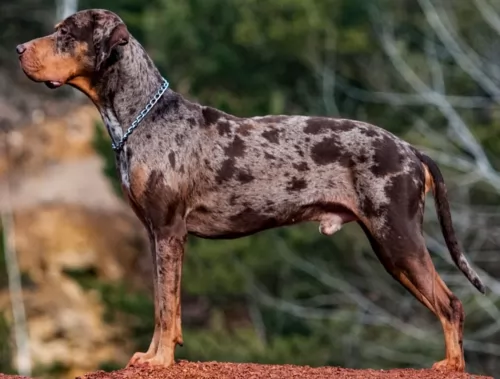 Catahoula dogs are the kind of dogs that make perfect family pets as they are all rounders. They’ve got characteristics that everybody wants in a dog. They are naturally protective, even they are not described as aggressive dogs. With training and socialization they get on well with children as well as other pets in the home. He is alert and territorial, which makes him a good watchdog, more so because he doesn’t particularly like strangers.
Catahoula dogs are the kind of dogs that make perfect family pets as they are all rounders. They’ve got characteristics that everybody wants in a dog. They are naturally protective, even they are not described as aggressive dogs. With training and socialization they get on well with children as well as other pets in the home. He is alert and territorial, which makes him a good watchdog, more so because he doesn’t particularly like strangers.
Intelligent and independent, training makes him wonderfully obedient and relaxed. However, give him the chance for ball games and a walk, and he is more than ready.
He is used to being a guard- and hunting dog, and this makes him an active, energetic dog. You will need to give him plenty of activities if you don’t want this amicable dog becoming anxious, frustrated and destructive.
Exercise him well, provide him with nourishing, top quality food together with fresh water and shower him with the love and attention he deserves as a family member. You’ll also join the ranks of Catahoula Cur owners who want to tell others about what an awesome pet he makes.
 The Maltese is a popular dog no doubt, and his smallness is a draw-card as he adapts easily to life in the city or the countryside.
The Maltese is a popular dog no doubt, and his smallness is a draw-card as he adapts easily to life in the city or the countryside.
He is loving, loyal, intelligent and responsive, making him a good family dog and being an excellent playmate for children. Teach your children how to respect animals because raucous, disrespectful kids might produce a nip from an agitated Maltese.
Being a light shedder is another draw-card, with him being looked upon as a hypoallergenic breed. He has got so many good things going for him that he is guaranteed to make you an ideal pet.
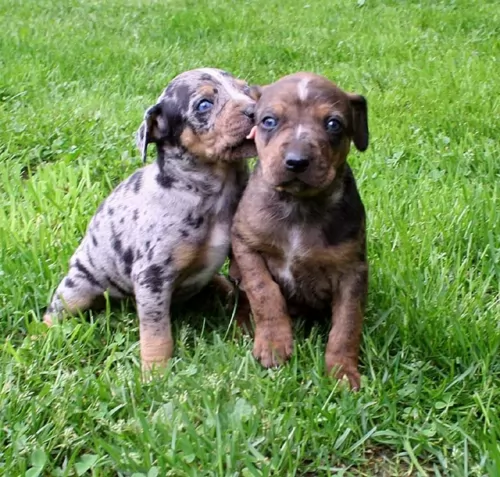 When you buy a Catahoula Cur, you can know that your pet is going to be fairly healthy, however there will be some common health issues to look out for, and by knowing about these health concerns, you can be better prepared.
When you buy a Catahoula Cur, you can know that your pet is going to be fairly healthy, however there will be some common health issues to look out for, and by knowing about these health concerns, you can be better prepared.
Your Catahoula Cur will be susceptible to some bacterial and viral infections which can be life threatening for him if he gets them. Some of these are parvo, distemper and rabies. That is why it is important to have your pet vaccinated, which can start at about 8 weeks of age for a puppy.
Obesity is a world-wide problem with humans and with their pets and it can open up a whole lot of problems with your pet’s health that he otherwise might not have got. It can play havoc with your pet’s digestion, and it can cause joint problems too.
It can be so tempting to pop a sweet treat into your pet’s mouth because you love him so much, but get to know what foods can actually be hazardous for him.
 Your Maltese is a feisty little thing who, with good care, can live for a good few years – up to 15 or even longer. As with any other dog, he can become ill. One or two illnesses to look out for include -
Your Maltese is a feisty little thing who, with good care, can live for a good few years – up to 15 or even longer. As with any other dog, he can become ill. One or two illnesses to look out for include -
Sebaceous adenitis is caused by inflammation of the sebaceous glands and is an uncommon skin disease found in some breeds of dog.
There are two types - one for long coated breeds and one for short coated breeds. For long or double-coated dogs, you’ll notice a white/silvery kind of dandruff on the coat as well as hair loss. There can also be skin lesions along the back and ears. It can make your pet miserable and he will need to see a vet.
A common hormonal problem is canine hypothyroidism, brought on by inadequate levels of thyroid hormones. Symptoms include hair loss, weight gain, coldness and a weakened immune system.
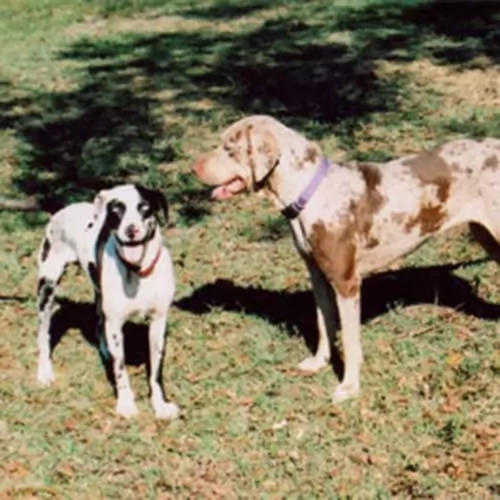 Your Catahoula Cur isn’t a high maintenance dog and a good brushing 2 times a week will keep his leopard coat looking shiny and free of loose hairs.
Your Catahoula Cur isn’t a high maintenance dog and a good brushing 2 times a week will keep his leopard coat looking shiny and free of loose hairs.
Catahoula’s have good teeth, and you want to keep them that way by brushing them at least 2 or 3 times a week to prevent dental decay and a host of other medical issues.
 Your Maltese is going to require quality food, water, exercise and shelter to enjoy a good life. The type of food you feed any dog has a direct impact on his health.
Your Maltese is going to require quality food, water, exercise and shelter to enjoy a good life. The type of food you feed any dog has a direct impact on his health.
You need to provide him with quality food, and if its commercially manufactured food, you need to read the labels carefully so that the food is appropriate to your Maltese. For instance, you can’t mistakenly pull a ‘large-breed’ packet of food off the shelves and expect your Maltese to be able to stomach it.
If you do buy him this kibble, make sure the ingredients are wholesome. To break the monotony of eating kibble every day, give him some boiled chicken, brown rice and some raw or cooked vegetables chopped up finely into his kibble. He will love you for this as it makes a tasty meal for him and will keep him healthy.
Try to keep his diet nice and simple to avoid digestive problems.
Make sure he has constant access to fresh, cool water.
Make sure your Maltese dog has a nice warm, dry place to sleep.
Get him to the vet if you notice that he is ill.
Brush his hair twice a week and take him to have it professionally cut if you prefer.
Clip his nails when they become too long and check around his eyes and inside his ears for any kind of infection.
These little dogs are prone to dental problems and he will need to have his teeth brushed 2 or 3 times a week.